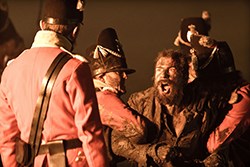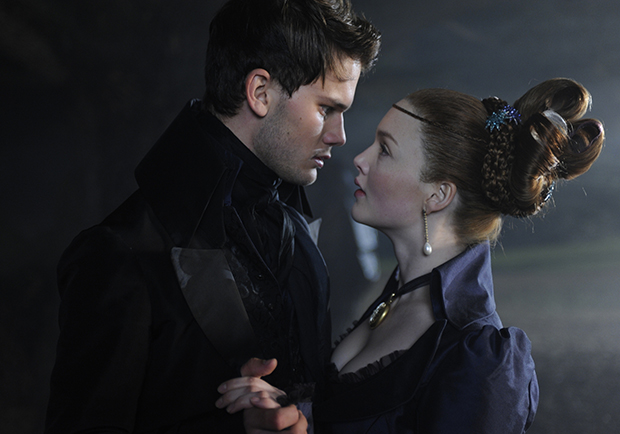According to IMDb, there are over three hundred film or TV titles adapted from or inspired by the work of Charles Dickens. And Mike Newell's adaptation of Great Expectation is one the best of them.
The biggest challenge facing a writer or director adapting Dickens's work, as Newell admitted to audiences at the 2012 Toronto International Film Festival, is the sheer length of the novels. Dickens mostly wrote serial novels (published in installments), and so there was an economic incentive to keep the story going (and customers buying) for as long as possible.
Many TV adaptations—Nicholas Nickleby, Bleak House, Little Dorrit—have successfully married Dickens's plots with the longer, installment-based miniseries format. But feature films must condense—and that means finding and sticking close to the core of the story.
Newell and screenwriter David Nicholls (who also adapted Hardy's Tess of the D'urbervilles for TV) have found that core masterfully. In adapting Great Expectations, they get rid of a few subplots (like a murder mystery) and use flashbacks judiciously, instead filling in backstory with dialogue.

Great Expectations was one of my five favorite films of 2012, so I was a little surprised that it languished on the shelf for over a year in between its festival debut and its American release. There might be a few reasons for that. While we tend to be more comfortable with corrupt characters who just happen to be rich, Dickens is concerned with the corrupting power that is inherent in money, and with how that power is woven into both individual and corporate structures.
Also, the novel has long been a staple of high school reading lists, so I suppose some viewers have residual educational trauma attached to the material. Maybe a bit of Dickens fatigue played a part.
But Newell's version stands out: its emotional core is not so much in the romance between Pip and Estella as in Pip's moral development and how the love story informs and complicates it. The titular "great expectations" refers to a mysterious financial gift rendered upon Pip. It's darkly ironic, like much of Dickens's work. Pip, an orphan apprenticed to a blacksmith, has no expectations of life. His spirit has not yet been crushed by poverty or too heavy a workload. But without a near-miraculous twist of fate, his future life seems all but predetermined and hardly, in his estimation, worth living.
The novel argues that if the poor can sometimes be accused of worshipping money, it partially because they see it as the only deliverance from the grinding hell of poverty. In times of financial hardship, people feel a lot of cynicism towards all institutions, because they fear that the forces meant to ensure justice—church, state, courts—are actually servants and instruments of mammon. (It's worth nothing that Great Expectations was written a decade after the first English translation of The Communist Manifesto and seven years before Das Kapital.)
If the film only depicted class resentment, it would still have its admirers. But it would hardly rise to the level of great art, that which is capable of challenging and inspiring us. This film knows that money, and the freedom it provides, does not so much build character as reveal it.

And in Pip, money reveals a great deal of self-loathing. Once Pip has money, he becomes ashamed of Joe, his friend and protector, because his behavior is not as refined as those raised as gentlemen. And our relationship to Pip as viewers gets more complicated, because some of Pip's self-loathing comes from his conscience, which convicts him of unworthy actions—but also from years of being treated contemptibly because of his poverty.
In a Q&A, director Mike Newell described Pip as sometimes acting like a "little s—t." But he insisted that we should filter our moral judgments through an awareness that Pip and Estella were a pair of "abused" children in the thrall of things (an economic system, the hatred of adults) they did not understand. When Pip stands before another character proclaiming that he wishes he could be more "deserving" of love, we understand that he is groping after moral clarity and self-love, every bit as much as wealth.
Caveat Spectator
Great Expectations is rated PG-13 for violence and some intense sequences involving human suffering. One character's clothing catches fire, and we momentarily see the effects of the burning before the death. Two criminals fight and attempt to kill one another with their bare hands. By contemporary standards the explicit content is relatively tame, although there is a great deal of emotional cruelty that might disturb some viewers.
Kenneth R. Morefield is an Associate Professor of English at Campbell University. He is the editor of Faith and Spirituality in Masters of World Cinema, Volumes I & II, and the founder of 1More Film Blog.









